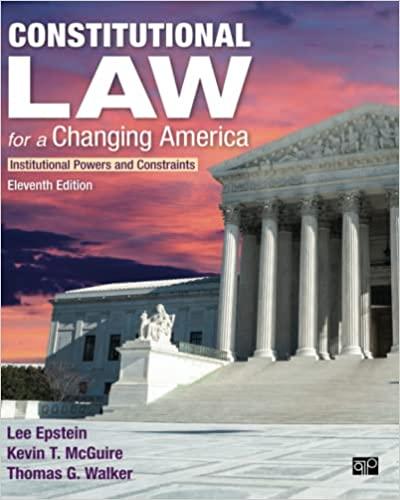Question
Please help, thank you 28.1. Why did industries become so much larger after the US Civil War, and how did this lead to abusive practices?
Please help, thank you
28.1. Why did industries become so much larger after the US Civil War, and how did this lead to abusive practices? What role did politics play in creating US laws fostering competition?
28.2. Suppose that BMW of North America tells its dealers that the prestigious M100 cannot be sold for more than $230,000. Explain why this could be a violation of antitrust law.
28.3. Explain how a seller with a monopoly in one product and tying the sale of that product to a new product that has no such monopoly is in any way hurting competition. How "free" is the buyer to choose a product different from the seller's?
28.4. Nikon sells its cameras to retailers at 5 percent less in the state of California than in Nevada or Arizona. Without knowing more, can you say that this is illegal?
28.5. Do a little Internet research. Find out why Curt Flood brought an antitrust lawsuit against Major League Baseball and what the Supreme Court did with his case.
28.6. Mammoth Company, through three subsidiaries, controls 87 percent of the equipment to operate central station hazard-detecting devices; these devices are used to prevent burglary and detect fires and to provide electronic notification to police and fire departments at a central location. In an antitrust lawsuit, Mammoth Company claims that there are other means of protecting against burglary and it therefore does not have monopoly power. Explain how the Justice Department may be able to prove its claim that Mammoth Company is operating an illegal monopoly.
28.7. Sirius Satellite radio and XM satellite radio proposed to merge. Was this a horizontal merger, a vertical merger, or a conglomerate merger? How is the market defined, in terms of both product or service and geographic area?
28.9. To protect its state's businesses against ruinous price wars, a state legislature has passed a law permitting manufacturers to set a "suggested resale price" on all goods that they make and sell direct to retailers. Retailers are forbidden to undercut the resale price by more than 10 percent. A retailer who violates the law may be sued by the manufacturer for treble damages: three times the difference between the suggested resale price and the actual selling price. But out-of-state retailers are bound by no such law and are regularly discounting the goods between 35 and 40 percent. As the general manager of a large discount store located within a few miles of a city across the state line, you wish to offer the public a price of only 60 percent of the suggested retail price on items covered by the law in order to compete with the out-of-state retailers to which your customers have easy access. May you lower your price in order to compete? How would you defend yourself if sued by a manufacturer whose goods you discounted in violation of the law?
Step by Step Solution
There are 3 Steps involved in it
Step: 1

Get Instant Access to Expert-Tailored Solutions
See step-by-step solutions with expert insights and AI powered tools for academic success
Step: 2

Step: 3

Ace Your Homework with AI
Get the answers you need in no time with our AI-driven, step-by-step assistance
Get Started


